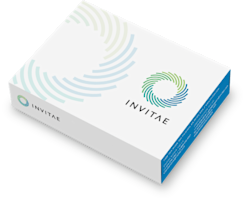
Invitae Elevated C4-OH Test
Test code: 06108 •
Test description
The Invitae Elevated C4-OH Test analyzes the HADH and HIBCH genes, which are associated with elevations of C4-OH acylcarnitine on newborn screening (NBS) or plasma acylcarnitine analysis. Genetic testing of this gene may confirm a diagnosis and help guide treatment and management decisions.
Ordering information
Turnaround time:
10–21 calendar days (14 days on average)New York approved:
YesPreferred specimen:
3mL whole blood in a purple-top EDTA tube (K2EDTA or K3EDTA)Alternate specimens:
Saliva, buccal swab, and gDNA are also accepted.Learn more about specimen requirementsRequest a specimen collection kitClinical description and sensitivity
Clinical description:
Elevated C4-OH acylcarnitine may be detected during newborn screening or acylcarnitine analysis due to 3-hydroxyacyl-CoA dehydrogenase deficiency, which is also known as medium/short chain acyl-CoA dehydrogenase (M/SCHAD) deficiency or 3-hydroxyisobutyryl-CoA hydrolase deficiency. Patients with M/SCHAD deficiency show phenotypic variability. Most patients present with hypoketotic hyperinsulinism due to defective allosteric regulation of glutamate dehydrogenase. Patients have also presented with fulminant feeding difficulties, lethargy, hypotonia, liver failure, hepatomegaly with coagulopathy, and even sudden infant death syndrome (SIDS). In addition to elevated C4-OH on acylcarnitine analysis, patients have been reported with various elevations on urine organic acids such as 3-hydroxyglutaric acid, glutaric acid, 4-hydroxybutyric acid, and mild dicarboxylic aciduria. In patients with higher residual enzyme activity, these biochemical abnormalities may only be present with a large protein load or while the patient is ill. Patients who are suspected of having this rare metabolic disorder need to be evaluated immediately, as periods of illness, fever, and fasting may lead to serious decompensation and sudden death. Early diagnosis and detection may improve the long-term outcome of these patients and may prevent sudden death. Patients are responsive to diazoxide therapy (PMID: 23430856).
Patients with 3-hydroxyisobutyryl-CoA hydrolase deficiency have been reported with an infantile-onset, progressive neurodegenerative disorder that can often mimic Leigh syndrome. In addition to elevation of C4-OH on newborn screening or plasma acylcarnitine analysis, these patients will have low HIBCH enzyme activity (PMID: 26026795).
Assay information
Invitae is a College of American Pathologists (CAP)-accredited and Clinical Laboratory Improvement Amendments (CLIA)-certified clinical diagnostic laboratory performing full-gene sequencing and deletion/duplication analysis using next-generation sequencing technology (NGS).
Our sequence analysis covers clinically important regions of each gene, including coding exons and 10 to 20 base pairs of adjacent intronic sequence on either side of the coding exons in the transcript listed below, depending on the specific gene or test. In addition, the analysis covers select non-coding variants. Any variants that fall outside these regions are not analyzed. Any limitations in the analysis of these genes will be listed on the report. Contact client services with any questions.
Based on validation study results, this assay achieves >99% analytical sensitivity and specificity for single nucleotide variants, insertions and deletions <15bp in length, and exon-level deletions and duplications. Invitae's methods also detect insertions and deletions larger than 15bp but smaller than a full exon but sensitivity for these may be marginally reduced. Invitae’s deletion/duplication analysis determines copy number at a single exon resolution at virtually all targeted exons. However, in rare situations, single-exon copy number events may not be analyzed due to inherent sequence properties or isolated reduction in data quality. Certain types of variants, such as structural rearrangements (e.g. inversions, gene conversion events, translocations, etc.) or variants embedded in sequence with complex architecture (e.g. short tandem repeats or segmental duplications), may not be detected. Additionally, it may not be possible to fully resolve certain details about variants, such as mosaicism, phasing, or mapping ambiguity. Unless explicitly guaranteed, sequence changes in the promoter, non-coding exons, and other non-coding regions are not covered by this assay. Please consult the test definition on our website for details regarding regions or types of variants that are covered or excluded for this test. This report reflects the analysis of an extracted genomic DNA sample. In very rare cases, (circulating hematolymphoid neoplasm, bone marrow transplant, recent blood transfusion) the analyzed DNA may not represent the patient's constitutional genome.
You can customize this test by clicking genes to remove them.
Primary panel
Question about billing?
Find answers